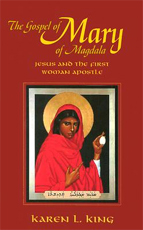"The Gospel of Mary offers a vision of Christian community in which authority is based not solely or even primarily upon a succession of past witnesses, but upon understanding and appropriating the gospel. Authority is vested not in a male hierarchy, but in the leadership of men and women who have attained strength of character and spiritual maturity. Prophetic speech and visions are given a place of primacy as the manifestation of spiritual understanding and the source of sound teaching. Christian community constituted a new humanity, the image of the true Human within, in which superficial distinctions of the flesh lacked any spiritual significance. Women as well as men could assume leadership roles on the basis of their spiritual development. The Gospel of Mary rejects any view of God as divine ruler and judge and, hence, repudiates those as proper roles for Christian leadership. The true model for leadership is the Savior, the teacher and mediator of divine wisdom and salvation who cautions his disciples against laying down fixed laws and rules that will come to enslave them.
"According to the master story of Christian origins, Jesus passed down the true teaching to his male disciples during his lifetime. They, as witnesses to the resurrection, were commissioned to go out and spread this teaching to the ends of the earth; and only later was that true apostolic teaching corrupted by Satan, who sowed the weeds of heresy in the apostolic fields. According to the Gospel of Mary, however, the weeds were sown by the apostles themselves. Men like Peter and Andrew misunderstood the Savior's teaching and sowed discord within the community. According to the master story, the full doctrine of Christianity was fixed by Jesus and passed on in the doctrines of the Church. The Gospel of Mary instead suggests that the story of the gospel is unfinished. Christian doctrine and practice are not fixed dogmas that one can only accept or reject; rather Christians are required to step into the story and work together to shape the meaning of the gospel in their own time. Because human passions and love of the world incline people to error, discerning the truth requires effort, and it insists that communities of faith take responsibility for how they appropriate tradition in a world too often ruled by powers of injustice and domination.”
